Hair loss is a common occurrence with various causes, and one of the prominent triggers is excessive sebum production. This condition often affects young individuals, particularly those in their 20s, when the sebaceous glands in the scalp become overactive and clog the hair follicles. Those affected by this issue typically notice symptoms such as an increase in dandruff, an oily scalp, and an uncomfortable itchy sensation. The accumulation of sebum in the hair follicles creates an ideal environment for bacterial growth, leading to inflammation and accelerated hair growth cycles. Consequently, hair becomes more prone to falling out, especially at the crown and temples, resulting in gradual thinning over time.
Hair loss not only impacts one’s physical appearance but also takes a toll on mental health for many individuals. To maintain a healthy head of hair, it is crucial to manage stress levels, and a balanced diet plays an immensely important role. Certain foods, when consumed in excess, can exacerbate hair loss. Here is a list of three food groups you should limit to protect the health of your hair:
Peanuts
While peanuts offer a rich source of nutrients, overconsumption can lead to excessive oil secretion in the scalp, particularly for those already prone to oily skin. Additionally, the high content of saturated fatty acids in peanuts can induce inflammation, adversely affecting scalp health. If you have a sensitive scalp or are prone to hair loss, it is advisable to monitor your peanut intake.

Excessive peanut consumption can lead to increased oil secretion in the scalp, especially for those already prone to oily skin.
Chocolate
Chocolate, particularly the commonly available varieties, contains high levels of sugar and can negatively impact your body when consumed in large quantities. Aside from contributing to weight gain, the sugar in chocolate stimulates the oil-producing glands in the scalp, accelerating the aging process of the skin. To mitigate these unwanted effects, opt for dark chocolate, which contains less sugar, satisfying your taste buds while preserving the health of your hair.

Chocolate, especially common varieties, is high in sugar and can negatively affect the body when consumed in excess.
Chili Peppers
Chili peppers do not directly cause hair loss, and when used appropriately, they can even support metabolism. However, chili peppers are often prepared with oil-rich spices or salt, which can increase sebum production and irritate the hair follicles, aggravating hair loss. Therefore, it is advisable to consume chili peppers in moderation and pay attention to their preparation to avoid adverse effects on the scalp.

Chili peppers can support metabolism when used appropriately but may irritate hair follicles when prepared with oily spices.
Adopting a sensible diet not only improves overall health but also helps reduce the risk of hair loss. Monitoring and adjusting your daily food intake will contribute to maintaining strong and lustrous hair. Listen to your body and make informed choices to strike a balance between health and external beauty.





































